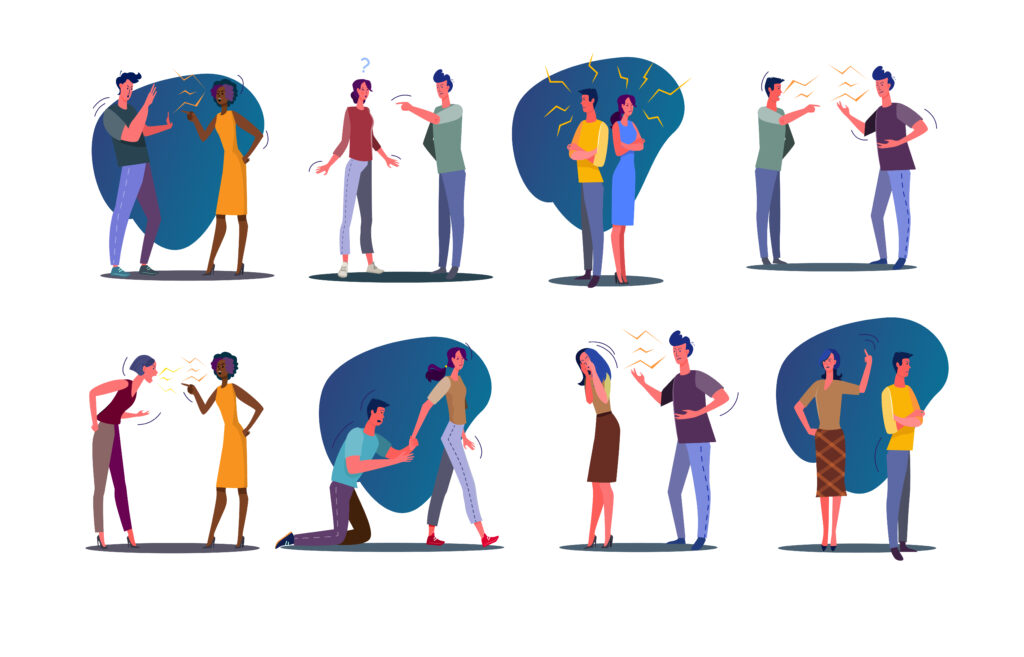Last updated on December 20th, 2024 at 01:15 pm
At some point in life, nearly everyone experiences relationship problems. These issues can vary from minor misunderstandings to significant conflicts that necessitate professional intervention. When someone you care about faces relationship challenges, it can be difficult to know how to help or what to say. In this article, we will offer practical advice on how to assist someone with relationship problems.
Listen actively and provide emotional support
One of the most important things you can do when someone is experiencing relationship problems is to listen actively. When someone is facing a tough time, they need someone to talk to and share their feelings with. By listening attentively, you demonstrate that you care and are willing to support them.
Provide emotional support by recognizing their feelings and validating their experiences. Refrain from giving advice or attempting to solve their problems immediately. Often, all someone needs is a shoulder to cry on or someone to express their frustrations to.
Be non-judgmental and empathetic
It is essential to be non-judgmental and empathetic when assisting someone with relationship issues. Avoid making assumptions, criticizing, or blaming them for their situation. Instead, strive to put yourself in their shoes and understand their perspective.
Show empathy by using phrases such as “I understand how you feel” or “That sounds really tough.” This approach creates a safe and supportive environment for them to share their feelings.
Assist them in identifying the core issues

In many instances, relationship problems stem from underlying issues that require attention. Assist your friend or loved one in identifying the core issues by asking open-ended questions and encouraging them to reflect on their circumstances.
Once the core issues are identified, it becomes easier to develop practical solutions that address the root cause of the problem. Encourage your friend or loved one to take action and implement the necessary changes to enhance their relationship.
Encourage Professional Help
At times, relationship issues can become too complex or overwhelming to manage on one’s own. Encourage your friend or loved one to seek professional assistance. This may involve couples therapy, individual therapy, or counseling.
Be supportive and non-judgmental when recommending professional help. Remind them that seeking assistance is a sign of strength, not weakness. Offer them resources and information on where to find professional support.
Avoid Taking Sides
If your friend or loved one is experiencing a conflict with their partner, it is crucial to refrain from taking sides. Taking sides can increase tension and make it more difficult for them to resolve their issues.
Instead, promote open communication and collaboration between both parties. Urge them to listen to each other’s perspectives and identify common ground. Assist them in working towards a mutually beneficial solution.
What is the best way to resolve relationship issues?
The most effective way to resolve relationship problems is to identify the core issues and work towards finding practical solutions that tackle the root cause of the problem. This process necessitates open communication, active listening, and a readiness to compromise and implement necessary changes to enhance the relationship.
How do you encourage someone to leave a bad relationship?
Encouraging someone to leave a harmful relationship can be a delicate and challenging process. It is crucial to approach the situation with empathy and compassion while also being honest and direct. Encourage the individual to reflect on their circumstances and identify the underlying issues. Provide them with information and resources on where to seek professional help and support. Remind them that leaving a toxic relationship is a sign of strength, not weakness.
How do you talk to someone about relationship problems?

When discussing relationship problems with someone, it is essential to approach the conversation with empathy and non-judgmental support. Listen actively and validate their feelings and experiences. Avoid making assumptions or criticizing them for their situation. Encourage open communication and collaboration, and work together to identify the core issues and find practical solutions.
What are the 5 steps to fix a relationship?
The five steps to repair a relationship are as follows:
Yes, a broken relationship can be repaired, but it demands effort and commitment from both partners. Both individuals must be willing to identify the underlying issues, communicate openly, and implement necessary changes to enhance the relationship. Seeking professional help or counseling can also be advantageous in addressing complex or long-standing problems.
How do you address a lack of support in a relationship?
To address a lack of support in a relationship, it is crucial to identify the core issues and work towards finding practical solutions that tackle the root cause of the problem. This may involve setting boundaries, prioritizing each other’s needs, and demonstrating empathy and understanding towards your partner. Additionally, it is vital to communicate openly and honestly and to seek professional help or counseling if needed.
Conclusion
In conclusion, assisting someone with relationship issues involves active listening, empathy, non-judgmental support, identifying core problems, encouraging professional help, and refraining from taking sides. By adhering to these practical tips, you can offer your friend or loved one the support and guidance they need to successfully navigate their relationship challenges.


